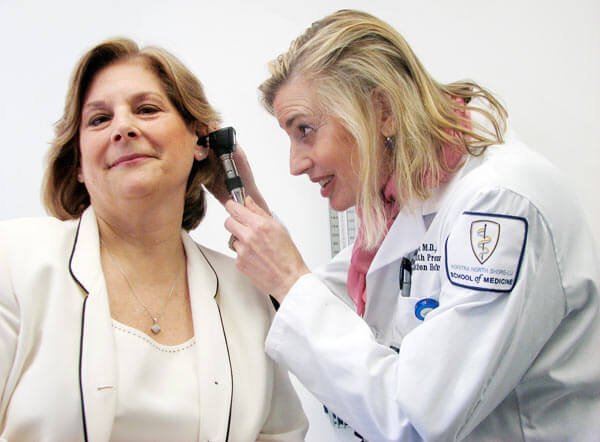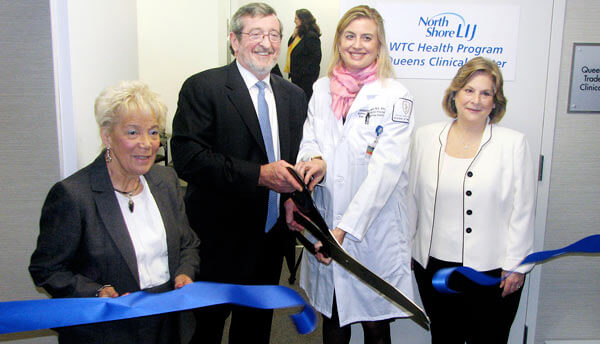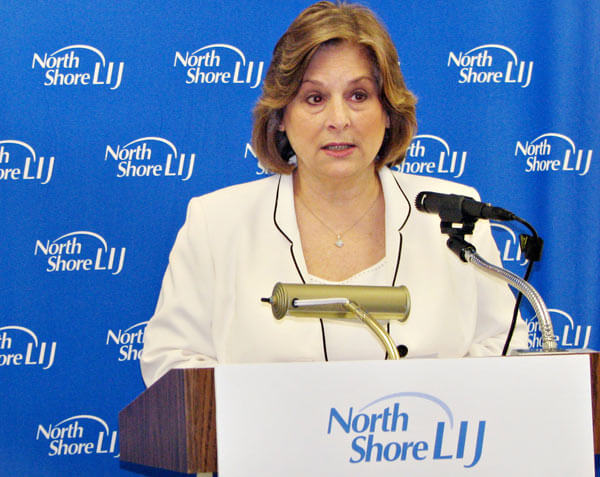By Steve Mosco
Like many heroic New Yorkers, Martin Grillo was heading toward the World Trade Center while others were running away on the morning of Sept. 11, 2001.
After spending months sifting through the wreckage at Ground Zero, the EMS worker found himself experiencing unexpected medical complications.
“I was walking and talking on my cellphone at the same time and all of a sudden, I couldn’t breathe,” said Grillo, a lifelong resident of Broad Channel. “I needed help and luckily I found someone who understood what was going on.”
Grillo had found North Shore-LIJ Health Systems’ Queens World Trade Center Clinical Center for Excellence, which moved to a new location last week to 97-77 Queens Blvd. in Rego Park. The 3,650-square-foot center, close to 50 percent larger than the previous facility in Flushing, is part of a federally funded program to provide medical and mental health services to first responders whose services at Ground Zero after the terrorist attacks left them with myriad health concerns.
The clinical center, which provides care for more than 3,000 first responders in Queens, received $3.85 million under the James Zadroga 9/11 Health and Compensation Act, meant to address health problems related to 9/11.
“Our center’s new space will allow us to better provide the needed care for our patients and increase our services as the program expands,” said Dr. Jacqueline Moline, the center’s director and vice president of population health at North Shore. “As we know, many first responders and others who worked for weeks and months at Ground Zero and debris sites after Sept. 11 are experiencing a range of serious heath problems.”
Moline said these health problems include lung disease, asthma and gastroesophageal disease as well as a variety of cancers. In addition, responders have also experienced ongoing mental health problems such as post-traumatic stress disorder, anxiety and depression, said Moline.
Lorelei Sander, a retired NYPD officer who was a first responder on 9/11, deals with health problems on a daily basis after spending several days at the World Trade Center disaster site exposed to a toxic environment.
Sander fell ill during her time at Ground Zero and was hospitalized with breathing problems for 12 days in late September 2001. She later developed a persistent cough, sinus irritation and GERD. She never returned to the disaster site because of her health problems, but did return to the force, retiring in 2004 after 20 years on the job.
“For the first time, I can honestly say that my health has improved and I now have quality of life,” she said.
The facility includes four examination rooms and is staffed by six part-time physicians, nurses, social workers and other health-care professionals. As the program expands, additional staff members are being recruited, including a nurse practitioner, a nurse oncology case manger and others.
“The federal funds allocated for this new center will help to let those who responded and put themselves in danger to know that they will never be forgotten,” said Borough President Helen Marshall. “Their physical, emotional and mental well-being depends greatly on our ability to link them with the services they so richly deserve.”
Grillo, who suffered tragedy a second time when he lost his Broad Channel house in Hurricane Sandy, said the personal care provided by the physicians at the center is not only confined to the examination room.
“They are very concerned with what the first responders are dealing with,” he said. “I come here and I know they care.”
Reach reporter Steve Mosco by e-mail at smosco@cnglocal.com or by phone at 718-260-4546.





































